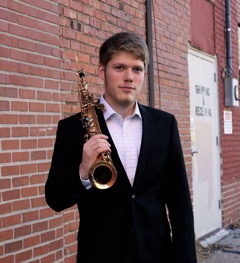
The Saxophone Ensembles Concert on Wednesday, Dec. 3 will pay homage to Adolphe Sax, celebrating the bicentennial of the life of the Belgian man credited with inventing the saxophone.
“In tribute to him, our concert will feature the saxophone in a way the typical concert-goer would never expect, showing the full capabilities of the instrument he created,” said Nick May, a junior Bachelor of Music student from Lincoln, who studies with Associate Professor of Saxophone Paul Haar.
The free concert at 7:30 p.m. in Westbrook Music Building Rm. 119 will feature three jazz saxophone sections, as well as everyone assembled in one large choir of saxophones playing Bach’s Toccata and Fugue in D minor and Tchaikovsky’s 1812 Overture, which May is arranging for the group.
“It will be an extraordinary experience and will have everyone amazed by the musical capabilities of this instrument,” May said. “There may also be birthday cake, so what else could you ask for?”
Haar has seen tremendous growth in his saxophone students, which was evident this summer when he was in France on tour with the Faculty Jazz Ensemble.
“I was sitting on a patio in France texting and facetiming with Nick May, who was in Singapore as the only American saxophonist invited to this international woodwind competition,” Haar said. “And at the same time as doing that, I was getting texts from Mike Foley, who was getting ready to go to Gap, France, for the International Saxophone Camp. I thought this was really great. When I first came here about 10 years ago, I thought, ‘Well, I hope we have some good students who are interested in doing things.’ And now, it was one of those moments where you were seeing what everybody is doing.”
May represented the U.S. in the Singapore Woodwind Festival, last summer, where he competed against 14 other saxophonists from around the world as finalists.
“I was able to spend almost half of my summer working on three pieces for the saxophone in depth,” May said. “By the time of the competition, I was playing musically and technically the best I ever have in my life. That, in itself, is very rewarding. Unfortunately, I wasn’t selected as a semi-finalist, but I have learned so much from the experience culturally and musically.”
In 2013, May won the Nebraska Music Teachers Association Nebraska Young Artist Woodwind Competition, and this year, he was named the winner in the Nebraska Music Teachers National Association Competition Young Artist Performance.
“Personally, competitions are a tough thing to do,” May said. “Besides the mental and physical preparation that takes months, they are tough on you emotionally.”
Haar said the entire saxophone studio benefits from these international experiences.
“Each one of these international trips that you do, you come back with a greater global perspective,” Haar said. “You start to see where you’re at, both in smallness and in greatness.”
Haar said his students this year are exceptional.
“The caliber is just spooky good and diverse,” he said. “I have some graduate students coming from Idaho and North Carolina. My undergraduates are from Missouri, South Dakota and Gering, Neb. I like the small-town kids. For them to get a chance to hear the stories of the upperclassmen doing all these things, I told them, ‘I expect you guys to do this.’”
May began studying privately with Haar as a freshman in high school, so choosing UNL was easy.
“I was always in awe of what he could do on the saxophone,” May said. “Every lesson I would just leave inspired from the few minutes he would demonstrate or play a lesson. I took a few lessons with other college professors, but I always came back to Dr. Haar. At the end of the day, I wanted what my ears were in love with.”
May said he simply loves this instrument.
“The history and repertoire only increase this passion,” he said. “No offense, but no other instrument has had the power to musically excite me as the saxophone can. That, in itself, makes it pretty easy to love playing.”